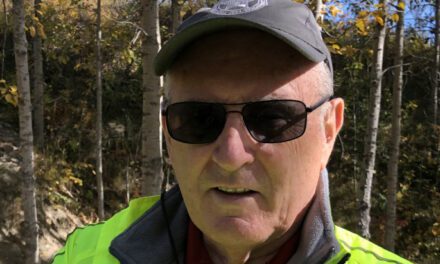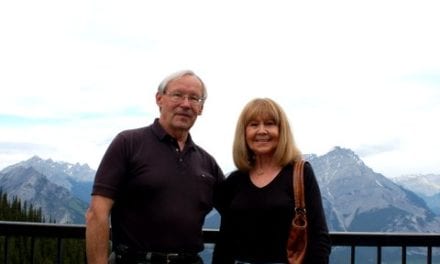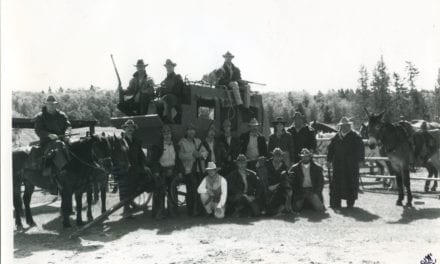Bill: “We didn’t have any choice. We would have gone there. If you were in Jasper it was the Jasper-Banff Highway; if you were in Lake Louise it was the Lake Louise-Jasper Highway. (laughter). Saskatchewan River Crossing, that was the cut-off point. Now they don’t have a warden on that damn highway as far as I know. They closed down “45,” they moved the house out at Athabasca Falls, so there is nothing between Jasper and Saskatchewan River Crossing. Nobody out in the bush.”
Perry: “Twenty years from now it will be, “That Warden idea, it was really good!”
Cheryl: “Yeah, we better get that back”
Bill: “There won’t be anybody to do it.”
Perry: “There is a lot of young people coming into the service and they are enthusiastic.”
Bill: “They are enthusiastic technically, which is good I guess but not from my way of thinking about the parks. They need guys like us out in the bush; boots on the ground.”
Perry: “I think they will come back to that.”
Bill: “When we took over the Blue Creek district, on the north boundary of Jasper, there were five cabin there.”
Cheryl: “That’s the cabin (shows a picture); 21 miles on a horse. I’m from here (Lethbridge); never been on a horse.”
Perry: “The district warden system was still intact then?”
Bill: “Oh yeah.”
Cheryl: “We lived out there year-round with a one-year-old.”
Bill: “The first winter we were there was that cold winter; ’68 – ’69. The thermometer went down to -50 Fahrenheit. Three mornings I went out and it (the mercury) was all in the bottom and we were living in a log cabin.”
Perry: “What did you do to keep warm?”
Bill: “We had a big woodpile. The guy before me, all he had was enough to start one fire. That’s all he worried about. When he got there (to the cabin) he got his chainsaw out, cut a tree down, got his horse, and skidded it back. Winter and summer a fire was laid when I left. In summer I just used the kitchen stove in the morning. A fire was laid and a bottle of matches was on the stove.”
Perry: “A bottle of matches?”
Bill: “So the mice couldn’t get them. If you got hurt and could get through the door of the cabin and strike one match you could get a fire going. That trip we took to Robson in the winter we snow-shoed up the Emperor Falls hill. There were two or three months, when I was on, they didn’t allow anybody up the Smoky. I think there was 54 active slides came down across the path up there. There was a guy stationed at Mt. Robson; he went bushy. His wife asked us to come out and help around the yard. The outhouse was maybe one hundred feet away but he used a 5 gallon bucket in the porch because he wasn’t leaving the porch; he was scared.”
Cheryl: “Bill designed an elk trapping program in Elk Island.”
Bill: “They said we broke too many legs live trapping them. So Bob Jones said, ‘Can you come up with something?’ We had this net; it was four-inch fish net made of 3/8” rope. We strung it up in the trees. The first time we caught some they run, hit that thing, jump, fall through and break their necks or break their legs. The net was about 16 feet high. So then I did this (shows a diagram) …. went around inside about twelve feet out and put a hitching rack in all the way around. So if they’re going to jump into the fence and are out here, they come to that hitching rack and they gotta jump. When they do they come to the bottom of the fence. If they go under it because it’s that high they are still at the bottom of the fence. We never had a broken neck or leg after that. “We made a bunch of panels – plywood panels. We took those to Grande Prairie, Freddie Dixon and I. We went up and got some buffalo from there. They took off from Willow Creek and showed up in Grande Prairie. We had to go get them. We got all but one of them up there.”
Cheryl: “That’s in Rob Kaye’s book, Born to be Wild.”
Bill: “Fred and I shipped them up to Rock Lake. Fred flew them in with the helicopter. Buffalo won’t stay. They are not going to stay in Banff. They are a migratory animal that travels from Wyoming to Alaska. They put them there with no fence around them; they are not going to stay there. “The ones that went up to Nahanni – Fred did that; took them up on the river on a barge.”
Perry: “Did you prefer one park over the other?”
Bill: “I liked Jasper but we kind of had a bit of a bad experience there when I left.”
Cheryl: “Oh, the chief warden! I went home to Lethbridge to have our son.”
Bill: “I came home on the weekend – here (Lethbridge). I went back (to Jasper) and back into the bush. John was out there; John Crawford – he wrote stories for “Field and Stream,” and “Outdoor Life.” He was an outdoor photographer; he happened to be out for two weeks there with me. I phoned (the Chief Park Warden) and told him I wanted a couple of weeks off. That’s when he said, ‘You got to make up your mind. Which comes first, your job or your family?’ John – he’s the one that saved me.”
Cheryl: “I think he went a little off the deep end.”
Bill: “Grrr! I was going to kill him. If it had not been for Norm Young (that’s Bob Barker’s ex-father- in-law). He came out and got me. “ I said, “Take me to the office!” Norman said, “You aren’t going to the office!” He took me to the doctor’s and he gave me two weeks sick leave and I came down here.
Cheryl: “We went to head office – Frank Camp, your old Chief Park Warden from Waterton. And he says, ‘We’re moving you to Yoho.’ ”
Perry: “Otherwise you would still be in Jasper?”
Cheryl: “We liked it up there.”
Bill: “Bob (Barker) and I and Alfie (Burstrom) and all those guys – when you were out in a district, that was your ranch. If you are going to come from Willow Creek to Smoky and had to go through Blue Creek you would phone me and say I’m coming through. Wardens didn’t go on another man’s place without telling him you were coming. That was courtesy.”
Perry: “What were your main responsibilities?”
Cheryl: “We didn’t have radios then. We had a forestry phone line he had to keep up.”
Bill: “It went all the way to Twin Tree. I had 35 miles to look after and then Ray Frey had 14 miles. Willow Creek had seven or twelve.”
Perry: “Did you have climbing spurs?”
Bill: “When I changed my insulators I had a big, tall horse seventeen hands, one of those R.C.M.P. colts. I could stand up in the saddle and I moved all my insulators up; I didn’t have to put the spurs on.”
Perry: “You had to have a fairly obedient horse to do that.”
Bill: “I always had one or two snotty horses, same with Bob Barker. We could handle them. A lot of the guys that came after us didn’t know which side of the horse to get on. When I was there whenever they said you can’t do that on a horse I did it.”
Cheryl: “You can’t pack a treadle sewing machine on a horse! He did and he brought me in a long bathtub with drain and legs right on top of the pack horse.”
Perry: “Law-enforcement: did you arrest any people, charge them?”
Bill: “When I was in Yoho I was the liaison between the Mounties and the wardens. Every morning I would go in to the police station and have coffee with the R.C.M.P. and go through the wanted posters.”
Perry: “This is your ‘I want to be a policeman,’ coming out.”
Bill: “I rode with them a lot. A couple of highway patrolmen in Jasper said they would sooner have me go with them on nights than some of the new police recruits that were coming out of Ottawa because they knew who I was and what I was going to do. I had a .44 Magnum on my hip; for self-protection – it was registered. It was one of the biggest handguns you could get at that time.”
Perry: “Did you have any bear incidents?”
Bill: “Once I got to Yoho I did a lot of bear trapping.”
Cheryl: “Whenever I opened a can (of canned goods) the empty can went into the fire and then he took it out and dumped it in this great big pit at Blue Creek.”
Bill: “Not one can left the house that didn’t go through the fire. The guy before us, I don’t know how many bears he killed and buried. He was sloppy. It’s what you made it out there. I dug a hole about eight ft. square, filled it half-full of brush, and dumped about eight gallons of diesel fuel on it, put everything else on top of it and burned it. Never had a bear problem.”
Perry: “What did you like about being a warden?”
Bill: “I got started working at the pony barns in Waterton. I liked people. I took people out on trail rides. Then I got on trail crew: I was fixing stuff for the public; I was making those trails good. When you got on as a park warden your main goal was to have a district. When you started off you were somebody’s assistant. When you were a grade two warden you could have your own district. That was your ranch, your responsibility. You had to keep the cabin up, you had to keep the trails up. If they were bad when you started the district you had to look after a trail crew for the summer.”
Perry: “Did the crew stay at the warden cabin?”
Bill: “The crew had a camp where their work was. When Mike Woledge was there he wrecked more equipment than the Jasper warden service had in the previous 20 years. The first trip we took packing in to Blue Creek the packhorse took off. “Mike started chasing him and hollering, ‘Get back here!’ “Leave him alone,” I said. ”He is not going anywhere.” “The horse kind of looks, ‘He’s not chasing me,’ so away he went again. Mike starts chasing him. “Leave him alone!” “Next time he gets about halfway along the pack string, looks back and sees no one’s chasing him, so goes back to the end and follows along.
“I had to haul water from the river so Cheryl could do the washing. I had a stone-boat, put a 45-gallon pail on it, hooked Major on it and went to get the water. He took off running. I had a long halter shank on him so I dug down, got him stopped. ‘You are not doing this to me.’ I unhooked him, put my saddle on him and a long shank snaffle with the chinstrap on it and went back and hooked him on the stone-boat. “Okay you want to go, let’s go!” “He turned around and looked (at the stone-boat). ‘So that’s what it is,’ and carried on; hauled the water to the cabin. “So ideas are going around in my head – ‘You can’t use blinders on him.’ “So I took that workhorse bridle and put it back on him. A couple of weeks later the trail crew comes out and want some skidding done, so I threw the saddle on him, hung a chain on the hames and off we went. (Hames – part of a horse harness. Two curved pieces of iron which lie upon the collar of a draft horse to which the traces are attached. ) “Get out of the way! Here he comes with Major.” “Then, ‘What have you done with that horse? Its not the same horse.’ “He was my pet after that. “All of my horses were always in top shape. I could ride them fifty miles a day.”




Bill was the first person I worked for when I became a warden in Yoho. But that was only for two weeks before I went to Waterton.
Great writing.
Bill was my mentor and District Warden I worked under in Yoho as a seasonal warden.
Summer of 1973 & 1974.
He was a great person.
Got to meet with him and Cheryl one evening in Magrath.
It had been almost 40 years since we had seen one another.
Called him up on the phone and this some what the way the call went,
” Hello is this Bill walburger?”
“I was when I woke up this morning.”
I introduced myself as a voice from past and spend a couple hours visiting with them.
Miss Bill, he was the real thing.
I only stayed in the warden service as a seasonal from 1972 > 1975.
There was nobody like the originals Hal Shepard Jack Woledge, Gord Rutherford, Dale Portman, Gordon Peyto, etc.
NOTE:E-mail julianrichaud@hotmail.com